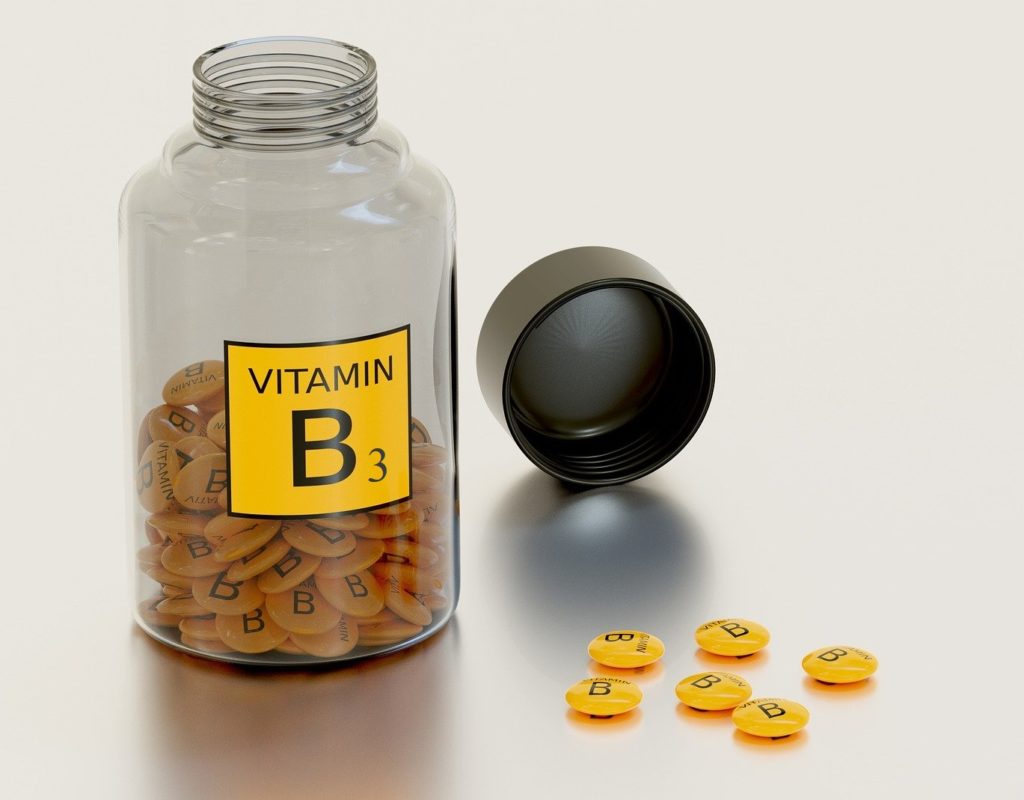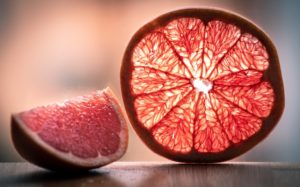Vitamin B3: Niacinamide
The B vitamin family consists of eight vitamins all of which are water soluble. They include:

- Thiamine or vitamin B1
- Riboflavin or vitamin B2
- Niacin or vitamin B3
- Pantothenic acid or vitamin B5
- Pyridoxine or vitamin B6
- Biotin or vitamin B7
- Folate or vitamin B9
- Cobalamin or vitamin B12
Many of the B vitamins have more than one form, each with somewhat different functionality. This applies to vitamin B3, which is generally available as nicotinic acid and niacinamide (sometimes called nicotinamide). As nicotinic acid, the vitamin has significant side effects, including a harmless skin flush that causes temporary skin heat, redness and prickling sensations. Nicotinic acid also has risks for blood sugar dysregulation and liver problems when used in higher doses (Djadjo 2021). Niacinamide, when used up to three grams per day, appears to be devoid of these risks (Knip 2000).
Function of Vitamin B3
In the body, niacin is a precursor for the compounds nicotinamide adenine dinucleotide (NAD) and NAD phosphate (NADP). These molecules are used extensively throughout the body in reactions related to energy production, nucleic acid (DNA) synthesis and other processes. NAD and NADP both transfer electrons in oxidation-reduction reactions. While complex, one of the main functions of niacin is in the production of the energy-providing compound adenosine triphosphate (ATP). As such, vitamin B3 is critical for numerous systems throughout the body.
Benefits of Niacinamide
Niacinamide has been studied for helping or treating a number of conditions including:
- Diabetes
- Cancer
- Inflammation and Infections
- Skin Conditions
Niacinamide and Diabetes
Niacinamide has been shown to have beneficial effects on insulin in diabetic patients. Insulin is a hormone that increases the uptake of sugar from the bloodstream for energy production. Type 2 diabetes is caused by both insulin resistance and problems with its production. In patients on medication, additional niacinamide was shown to actually increase insulin production (Polo 1998). This helped patients control their blood sugar similar to the use of insulin directly.
Animal studies have also shown benefits in models of diabetes. In chemically induced diabetes, niacinamide was effective in reversing most of the damage when used in high enough doses (Abdullah 2018). With niacinamide, blood sugar levels improved.
While there are older studies that appear to show problems with niacinamide and blood sugar, it might be due to the fact that unpurified niacinamide sometimes contains significant nicotinic acid (Greenbaum 1996). As mentioned, nicotinic acid is well known to cause problems with blood sugar. Longer trials of high dose niacinamide have not found problematic effects on blood sugar with its use (Cabrera-Rode 2006).
Niacinamide and Cancer
In patients with a history of non-melanoma skin cancer, niacinamide was used to try and prevent further skin cancer incidence. The treatment was successful, reducing skin cancer by 13% after one year (Chen 2015).
Although not as well documented, case studies also exist for treating cancer with niacinamide combined with high doses of vitamin C. Cases of bone, breast, ovarian and lung cancer all were reported to benefit (Hoffer 2000). Niacinamide may support regression or remission with high doses. More data is needed before any definitive conclusions can be drawn but considering its safety, more research on niacinamide and cancer would be interesting.
Niacinamide and Immune Function and Inflammation
Vitamin B3 appears to have beneficial effects on immune function and inflammation. Initial reports on niacinamide treatment of arthritis in the 1940s showed positive results, although dosing schedules were sometimes intense. In severe cases, one author was recommending hourly dosing of the vitamin, likely impractical for most patients (Prousky 2015). A more recent study found high doses of niacinamide improved arthritis by 29% (Jonas 1996). Inflammatory markers with the vitamin reduced as well.
A trial using niacinamide enema for inflammatory bowel disease (ulcerative colitis) also found benefits (Li 2017). After six weeks of daily treatment, almost 90% of patients had remission.
Niacinamide also appears to benefit the treatment of infections. Animals infected with antibiotic resistant staph bacteria (MRSA) and other relevant bacterial pathogens had profound improvements in bacterial clearance with oral niacinamide (Kyme 2012). Studies also appear to show significant promise for niacinamide in treating tuberculosis and human immunodeficiency virus or HIV (Murray 2003).
Niacinamide and Mental Health
Some early evidence also suggests benefits for mental health conditions with the vitamin. Human case studies for anxiety are mixed, with one case study finding no effect, yet other case studies showing benefits (Prousky 2010, Prousky 2005, Prousky 2004). It’s also worth noting that animal studies have found significant benefits for reducing anxiety with niacinamide (Hollis 2015). Based on the data, it’s possible that some individuals may respond to niacinamide, although more clinical trials are needed to understand the effects.
Niacinamide and Skin
Benefits for skin conditions have also long been reported with niacinamide. Topical preparations have found benefits in treating acne, allergic skin diseases and increased pigmentation on the face (melasma) (Song 2019). There is even a report of anti-aging benefits with topical niacinamide for reducing fine wrinkles, yellowing and blotchiness of facial skin (Bissett 2004).
Conclusion
Improving energy production throughout the body often has benefits on functioning. Niacinamide, a form of vitamin B3, appears to help a number of conditions, at least partly through improved production of energy and ATP. Research is starting to suggest benefits for diabetes, immune function, inflammation and skin conditions with minimal side effects.



